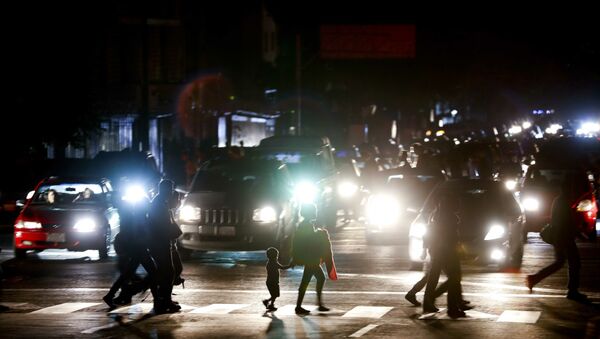Sputnik has discussed the blackout and the consequences that it may have for both Gaudio and incumbent President Maduro with journalist Nick MacWilliam.
Sputnik: Venezuela’s chief prosecutor has launched an investigation against the opposition leader Juan Guaido for his alleged involvement in sabotaging the country’s national grid, alongside numerous charges including fomenting mass violence. How significant is this development and what effect will this have on Guaidó the image and status held by supporting countries in the West?
Nick MacWilliam: The blackout has been going on for around five or six days now, it's affected the entire country's power grids also water supplies been affected, so of course the government has to look into what's caused it. Obviously, this could be the result of sabotage, but there are other areas I'm sure the government is looking into, such as a system failure obviously, and as well as being subject to sanctions going back two years, but prior to that as well. For the government not to look into every different area would be a basic just their dereliction of duty to the people. There's no concrete evidence yet come out that it's Guaidó or the Venezuelan opposition is responsible but if we look at sort of circumstantial evidence, there is strong suspicion which is justified that this is a kind of a form of sabotage.
READ MORE: India Unlikely to Toe US Sanctions on Venezuelan Crude Purchase — Research Head
We've seen US interventionist strategy in the past, Chile in the 1970s and Nicaragua in the 1980s, to destabilize the government in both places which targeted infrastructure. We also have seen the current reaction from US political figures in the Trump administration, Mike Pompeo was tweeting just a few hours after the blackout began, that this was the next step to remove Maduro, where he said: 'No power, no lights, next — no Maduro'. There's certainly been political exploitation that goes around this regardless of what the actual cause. Now Guaidó's image internationally, his kind of claim to the presidency seems to have lost momentum but even the Latin American countries which previously had had strongly supported Guaidó seem to be getting cold feet around him now — so basically the US and why voting getting increasingly isolated.
Sputnik: Could we see retaliatory actions taken against Maduro/supporters of the Maduro government domestically in Venezuela?
Sputnik: As tensions grow between the US supported Juan Gaudio and Maduro’s government; how will Guaidó and the US respond to the investigation and numerous accusations presented by Venezuela’s Supreme Court?
Nick MacWilliam: As I said, it looks to me like the US was kind of, depending on Columbia for any sort of military intervention strategy. Columbia seems to have very much taking a step back from that; I mean I wouldn't discount it all together but I think these governments have realised what it would imply for themselves like for Columbia, who is also going through a peace process… To have a war break out in Venezuela it'd be disastrous for Columbia. They share 2000 kilometers of border; it would obviously spill over into the country. So these kinds of their own internal problems, the last thing they need is intervention and also, you know, their populations are probably not going to just willingly accept it — they would face huge huge social unrest.


